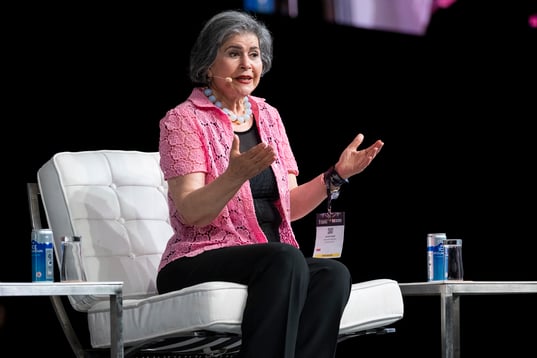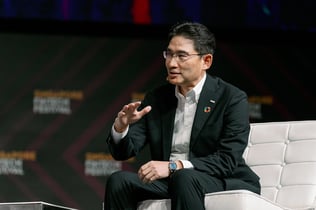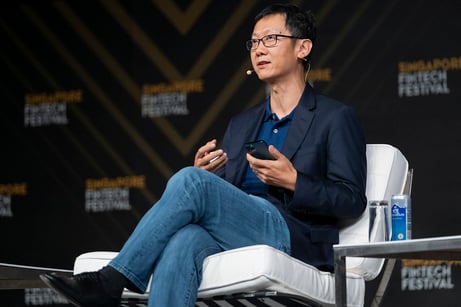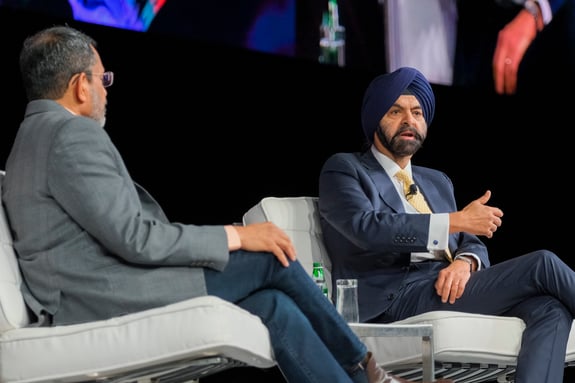Is ESG beyond redemption, plagued as it is with accusations of greenwashing? Or is it just now on the cusp of transformation?
This was the question posed by Darian McBain, Founder and CEO of Outsourced Chief Sustainability Officer Asia, at the recent Singapore FinTech Festival. She was moderating a panel titled Tech infrastructure for ESG: Global leaders' assessment.
Panellist Jaleh Daie, Managing Partner at Aurora Equity believes that there is truth to both positions: “I would compare [ESG] to a patient in the intensive care unit (ICU),” she says. But while ESG continues to suffer from the ailment that is greenwashing, she believes that things are looking up.

“In the ICU, you have the best doctors and the greatest hope…we are now aware of the problems that we ourselves created, and awareness is always the first step to remedy. In a year or so, we will be on the path to recovery,” she explains.

We are entering the next stage of ESG, said Tetsuro Imaeda, Representative Director and Deputy President of SMBC.
Indeed, the recent COP28 summit shows some promising signs - with nations striking an unprecedented deal to transition away from the use of fossil fuels.
ESG as an economic model
But for ESG goals to truly become a priority, it needs to return to the economic model, said fellow panellist Forest Lin, Corporate Vice President, Head of Tencent Financial Technology at Chinese tech giant Tencent.
 Eric Lim, Chief Sustainability Officer, United Overseas Bank Limited shared similar sentiments.
Eric Lim, Chief Sustainability Officer, United Overseas Bank Limited shared similar sentiments.
“You’ve got to make sure that there’s a commercial ROI…that brings the market discipline back into what you should be investing versus what you should not, and that may pave the way for a much more sustainable path towards sustainability,” he said.
Take the building industry, for instance. In 2021, the industry accounted for nearly 40% of the world’s carbon emissions, according to the 2022 Global Status Report for Buildings and Construction. But oftentimes, building developers lack the incentive to use green technology when such technologies are associated with higher costs, Lin explained.
Instead, Lin highlighted the need to incentivise such developers by lowering costs, such as by lowering financing costs.

The public sector as an orchestrator
With that said, however, it is unlikely that the private market will be able to organise themselves. Rather, it will require national-level orchestration, said UOB’s Lim.
“[Orchestration is] going to give clarity to the real economy in terms of what to invest in, and give clarity to the financiers on what is bankable or not bankable,” he explained.
It is in this regard that public sector institutions like the World Bank can play a pivotal role.
First, the public sector needs to address the potential regulatory and political risks of ESG development projects, said Ajay Banga, President of the World Bank. Ajay was speaking at a fireside chat alongside the Monetary Authority of Singapore’s Managing Director Ravi Menon on the last day of SFF.
Ajay used the renewable energy market as an example. If a country lays out a clear roadmap for the next decade on their plans for solar and wind energy, private sector operators will have greater confidence and assurance that renewable energy is a market worth investing in or developing in the near future.
Likewise, providing predictability around regulation would allow private sector parties to conduct a more comprehensive risk assessment. This would involve some form of predictability around areas like tariff and distribution policies, Ajay said.
“If you do not know that the utility that you're negotiating with, as a manufacturer of solar energy, is going to pay you the following revenue per unit, there is no way that any spreadsheet that you make can incorporate a risk-adjusted return that makes sense to an operator,” he explained.

Role of the World Bank
During the fireside chat, Ajay also shared his vision for how the World Bank can be an asset in guiding governments in creating these policies as well as providing political risk guarantees to incentivise investments into green tech.
For example, the World Bank provides political risk guarantees through the Multilateral Investment Guarantee Agency (MIGA). Ajay shared that MIGA today provides about US$7 billion in guarantees for the private reinsurance market, providing a sense of assurance to private sector operators.
Additionally, the World Bank is also looking into being the back office of guarantee provision for all other multilateral banks, according to Ajay.
Another key avenue in which the World Bank seeks to make a difference is in the development of a voluntary carbon market.
Moving resources from the developed world to the developing one to help with issues surrounding renewable energy, soil degradation and biodiversity is not going to happen simply by taxing the developed world, Ajay said. A voluntary carbon market that is transparent and reliable is essential for these efforts.
Ajay shared that the World Bank is looking to create reliable carbon credits with fair pricing to ensure resources move towards the relevant communities. “We do a jurisdictional audit end to end to ensure that the credit is green…and we’re going to try and get that into a system where pricing can then improve through the certification of the Bank being involved,” he elaborated.
But no matter how generous multilateral development banks or donor governments are, the public sector alone is unable to provide the trillions of dollars needed to solve the challenges present today, Ajay emphasised.
Rather, the private sector’s contribution is indispensable to addressing it. In a message to the private sector, he said: “Your task is to break through the arbitrage advantage of incumbency, and break through in a way that enables access for women and young people and change their lives. Because young people and women are our future.”
Missed these highlights from the Singapore FinTech Festival? Catch the full sessions now on the Elevandi Insights app! Available on iOS and Playstore

-1.webp?width=900&height=600&name=SFF%20900%20x%20600%20-%20networking%20(4)-1.webp)





